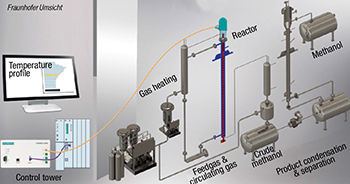A process that produces methanol from the gases generated at a steel mill will soon be field tested. The process has been under development for the last five years by researchers at the Fraunhofer Institute for Environmental, Safety and Energy Technology (Umsicht; Oberhausen, Germany; www.umsicht.fraunhofer.de) as part of Carbon2Chem project (www.thyssenkrupp.com/en/carbon2chem). A demonstration-scale plant, which produces 2 L/h of methanol, has been successfully operating in Oberhausen.
 The demonstration plant features a fiber-optic temperature-measurement system (diagram) with 36 measuring points along the reactor axis. They allow a detailed evaluation of the catalyst activity. “To further optimize the processes, we combined simulation and experimental studies at demonstration scale,” says Andreas Menne head of the Low Carbon Technologies department. “At the same time, we would like to further link the results from the process simulation and the operation of the plant,” says Menne. For this purpose, a digital twin of the plant is currently being created. In the future, it should be possible to control the plant in such a way that it can respond in advance to fluctuating boundary conditions, such as hydrogen availability, gas volume flows and gas compositions. Necessary maintenance intervals, for example to change or regenerate the catalytic converter, could also be planned precisely.
The demonstration plant features a fiber-optic temperature-measurement system (diagram) with 36 measuring points along the reactor axis. They allow a detailed evaluation of the catalyst activity. “To further optimize the processes, we combined simulation and experimental studies at demonstration scale,” says Andreas Menne head of the Low Carbon Technologies department. “At the same time, we would like to further link the results from the process simulation and the operation of the plant,” says Menne. For this purpose, a digital twin of the plant is currently being created. In the future, it should be possible to control the plant in such a way that it can respond in advance to fluctuating boundary conditions, such as hydrogen availability, gas volume flows and gas compositions. Necessary maintenance intervals, for example to change or regenerate the catalytic converter, could also be planned precisely.
After the completion of this test phase in February, the demonstration plant will be moved to the Carbon2Chem technical center at a steel mill in Duisburg, Germany later this year. There, the demonstration plant will be operated under real industrial conditions until the end of the project term in May 2024.